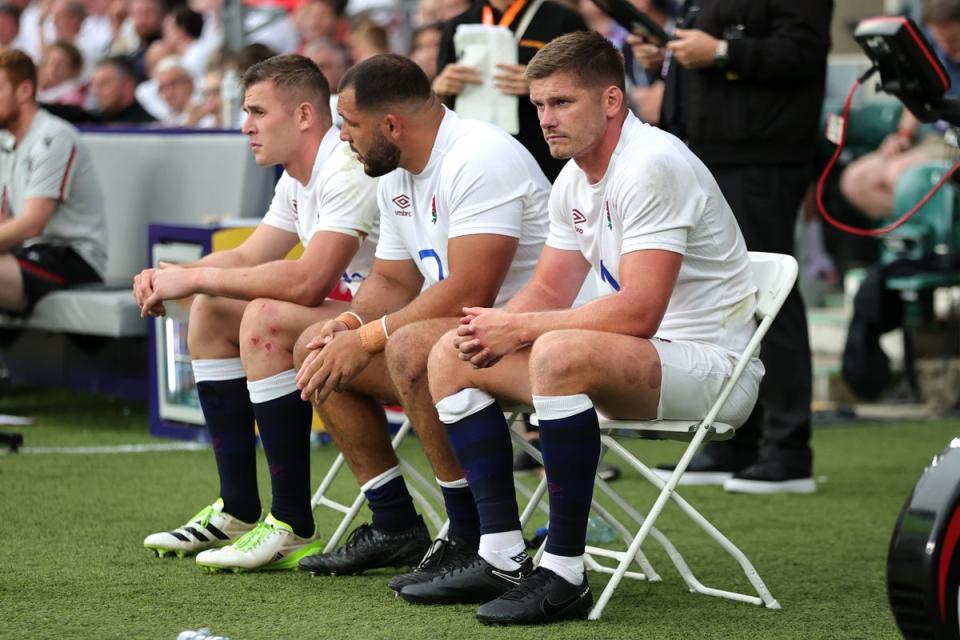Owen Farrell currently awaits a further decision on his Rugby World Cup fate as a second hearing looms next week following the World Rugby appeal against his rescinded red card.
Farrell faced the initial disciplinary hearing for a breach of Law 9.13: “A player must not tackle an opponent early, late or dangerously. Dangerous tackling includes but is not limited to tackling or attempting to tackle an opponent above the line of the shoulders even if the tackle starts below the line of the shoulders.”
Due to previous offences, Farrell could face a ban that would make him unavailable to play in some, if not all of England’s upcoming World Cup campaign which begins in France on 9 September if World Rugby were successful in their appeal.
The World Rugby Coaching Intervention Panel, commonly referred to as ‘tackle school’, is a system put in place which aims to “reduce head contact by reducing the risk of foul play caused by poor technique.” Participation in the programme allows the player to have the final match/week removed from their ban.
Farrell has already attended one Coaching Intervention Panel this year after a high challenge while playing for Saracens in a Premiership fixture in January of this year, which resulted in his ban being reduced from four weeks to three.
A regulation in the law states that a player may only take part in the intervention if they’ve “been sanctioned for the first time by a disciplinary panel for foul play involving contact with the head’, which means that in Farrell’s case, this option is no longer possible.
What is Farrell’s previous record?
His previous bans for similar instances before this year were both against Wasps in the Premiership while he was playing for Saracens. The first incident saw him receive a two-match suspension in 2016 for a tackle on Dan Robson, and the second five weeks in 2020 for another high-hit on Charlie Atkinson.
The most recent offence against Wales starts with an initial mid-range six-week ban if there is no mitigation given that contact to the head was made as Farrell’s shoulder connected with Taine Basham’s head.
In order for World Rugby to be successful in their appeal, they may have to prove that there were no mitigating factors involved, therefore retaining the status of the red card
The decision made during the newly introduced bunker process was that there was a ‘high degree of danger, no mitigation’, which resulted in the card being changed from a yellow to a red.
In the initial disciplinary hearing with Six Nations however decided that the mitigating factor was that England’s number two, Jamie George’s, influence on Basham had caused a change in the Welsh player’s direction, which had an impact on Farrell’s preparations to tackle.
Their verdict said: “The player [Farrell] argued that there was a late change in the dynamics of the tackle resulting from contact between W20 [Basham] and Jamie George (E2), which in turn resulted in a sudden and significant movement, a sudden and significant drop in W20’s head height, and a change in direction from W20.”

The match where the incident occurred was part of the Summer Nations Series, which is run by Six Nations. As it was then a Six Nations and not World Rugby hearing, World Rugby then had the right to appeal the decision made by Six Nations.
Is there a precedent for this case?
This has happened twice in the past, in 2012 and 2013. Additionally, in 2016, World Rugby carried out a separate misconduct charge following Six Nations’ failure to charge England forward Joe Marler with comments made towards an opposing player in a Six Nations fixture.
In 2012, All Blacks flanker Adam Thomson was cited for stamping on an opposition player in a Test against Scotland. His ban was increased from one week to two after the additional hearing following a successful appeal from World Rugby, then called the International Rugby Board. In 2013 World Rugby had a failed appeal against a decision to clear Australian James Horwill of stamping.
World Rugby will now have to prove that there are no mitigating factors involved, which would mean that the captain was never in the correct position to make a legal tackle in order for the red card to be reinstated and a ban to be given out.
What games could Farrell miss?
A six-match ban would potentially see Farrell unable to compete in five of England’s Rugby World Cup fixtures, as well as one warm-up match.
England’s next game after the hearing would be against Fiji at Twickenham, the final of their warm-up matches.
After that, he would then miss all four of England’s pool D fixtures against Argentina, Japan, Chile, and Samoa. This would then leave one match remaining on the ban, which would carry on into the World Cup should England progress past the group stage, or become effective again at the first match he would be available for after the tournament, likely a club fixture.
Basham, who failed his head injury assessment at Twickenham following the collision, returns to the bench for Wales for their match against South Africa in Cardiff.
Article courtesy of
Source link